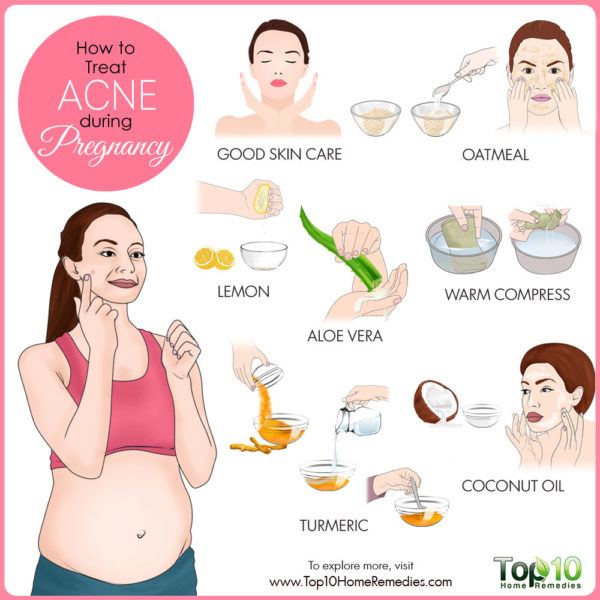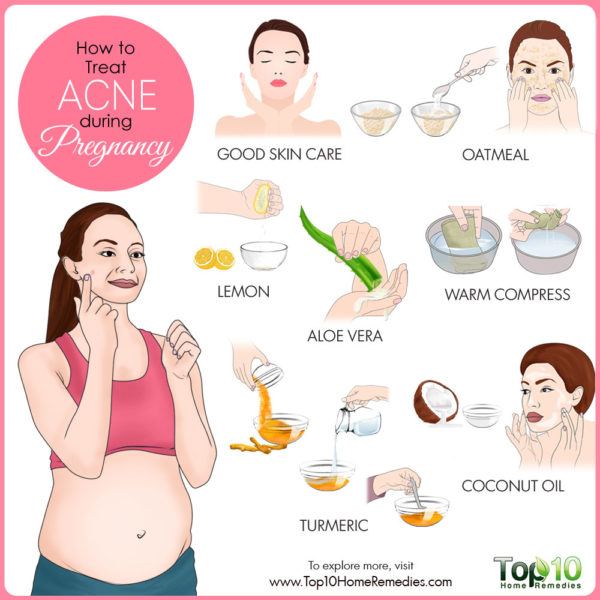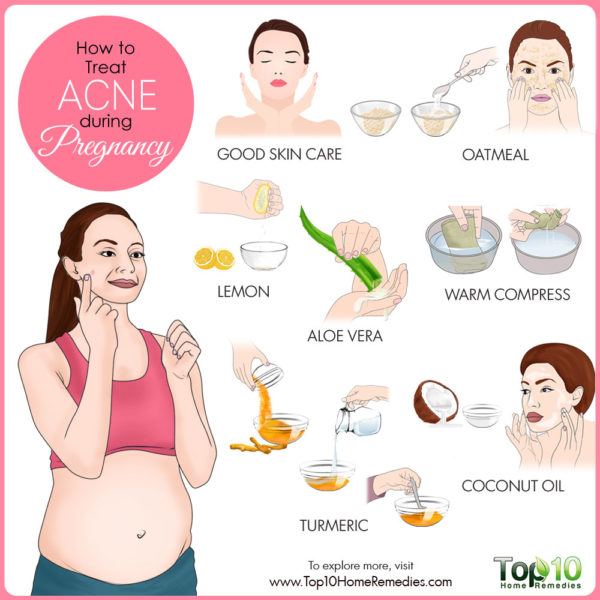Acne During Pregnancy

Contents:
- Causes of Acne During Pregnancy
- The Use of Beauty Products During Pregnancy
- Treatment of Acne
- Acne Medications During Pregnancy
- Conclusions
Acne and Pregnancy
It is known, that a pregnant woman possesses particular charm. However, she may be bothered by skin problems. Acne is a common complaint during pregnancy. Acne is considered one of pregnancy signs and very often can spoil a woman’s mood. Breakouts may appear on different areas, such as forehead, chin, chest, back, shoulders, and stomach. Sometimes, acne can leave marks in the form of spots and scars. This problem requires an intensive care routine.
Causes of Acne During Pregnancy
The most unpleasant thing is that even a careful treatment of acne can be ineffective. Why?
- Skin defects during pregnancy may bother until birth or even after. Causes for acne in this period are the intensive changes in endocrine profile. Higher levels of progesterone cause an increase of oil production in skin. Pores are clogged and it leads to the inflammation in glands and the nearby hair follicles.Pregnant women, who use less of liquid, are more prone to acne. A quick dehydration leads to an increase of progesterone levels in blood.
- Stress is a common reason for skin rash. Although, there are many stress factors in our life, you should take it easy! Acne is a sign of pregnancy and will disappear after childbirth.
- Another factor is a genetic disposition. If your mother or sister suffered from rash during pregnancy, most likely you should face the same problem.
Long ago people believed that they could predict a child’s gender by acne. It was considered, that if a woman had intensive breakouts during pregnancy, she would deliver a girl. However, it is not true! A baby's gender does not depend on a woman’s skin state. Some pregnant women do not have any skin rash. Although, the situation may change during next pregnancy.
Non-pregnant women may also suffer from rashes, especially before menstruation. It also depends on changes in endocrine profile. Hormonal changes before menstruation activate the function of sebaceous glands and can lead to breakouts. Typically, breakouts are severe in early stages of pregnancy and reduce after the first trimester.
The Use of Beauty Products During Pregnancy

Today women have a great choice in skin care and medicine available for acne. However, a number of over-the-counter products are not recommended for use during pregnancy. The components of creams, ointments, gels, and other medications possess substances, which may cause harm to a fetus. Therefore, before starting any treatment, be sure to read instructions carefully and consult dermatologist and gynecologist.
It is particularly important for a pregnant woman to avoid using medications, which contain salicylic acid and retinoids – derivatives of vitamin A. The use of retinoids may produce a teratogenic effect. Medications containing peroxides, benzene, steroids, or antibiotics should be eliminated. Products containing alpha-acids, including glycolic acid, are less harmful to a fetus.
A pregnant woman should avoid phototherapy, chemical peel and laser applying in acne treatment. Cosmetologists do not recommend facial cleansing and scrub use as well. The first piece of advice is to calm down! After delivery, endocrine profile will come to normal and rashes will disappear gradually. Time is on your side!
After childbirth most women practice breastfeeding. During lactation hormones are still imbalanced and acne may appear again. However, not all women have breakouts during pregnancy. After ending lactation, a woman can use any cosmetic products.
Treatment of Acne

Despite careful skin treatment and healthy lifestyle, pregnant women may experience severe forms of acne. Pimples may appear on forehead, chin, shoulders, back, and abdomen areas. During pregnancy acne may come and go or last entire period. Acne may be distressing and uncomfortable for a woman and requires careful treatment. However, it is recommended to avoid self-treatment and consult a doctor before using any medication.
Each person has his own skin type. This fact should be to taken into consideration in acne treatment. Moreover, breakouts on back and abdomen areas differ from breakouts on face. A specialist should warn a woman about all possible risks of drug use and choose the most appropriate way of treatment. Acne treatment is individual for each person. There is a great variety of acne remedies, such as herbal lotions, creams, and ointments. Nevertheless, a healthcare provider should be consulted firstly before any product is used to treat acne during pregnancy.
Acne Medications During Pregnancy
- Camomile, beggar ticks, and marigold brews.
- Neutral (colorless) henna masks. Dilute henna powder with water according to the instruction and apply on problem skin zones for 15 minutes. Henna masks should be applied 2-3 times a week. Use the masks only on cleaned skin.
- Creams containing glycolic acid or other alpha-hydroxy acids (lactic acid, citric acid, malic acid, mandelic acid, tartaric acid, lactobionic acid).
- "Skinoren" gels and creams are effective treatments for acne, but sometimes they may cause skin redness or irritation. “Skinoren” contains benzoic acid. Applying of “Skinoren” during pregnancy, especially in early stages, is permitted in case of urgent necessity and after consulting a doctor.
- "Zinerit" lotion contains erythromycin and zinc. The lotion produces antibacterial, anti-inflammatory, and comedolytic effect. During pregnancy it can be used only according to the instruction.
- Ointments and creams with antibacterial and anti-inflammatory effect (“Eplan”, “Kvotlan”,”Cinovit”).
- “Kvotlan” does not contain antibiotics, hormones and alcohol. “Kvotlan”, “Eplan” and “Cinovit” creams are safe in using during pregnancy. These medications cure acne and normalize sebaceous glands function.
Conclusions
Acne and breakouts during pregnancy are signs of hormonal imbalance. It will disappear after birth. Try not to pop acne, as it may lead to infection spreading. Pregnant women should avoid out-of-counter drugs. Acne may be distressing during pregnancy. In any case, you should consult your healthcare provider before choosing any method of acne treatment. A qualified specialist can recommend an individual treatment, which will help in reducing severe symptoms.